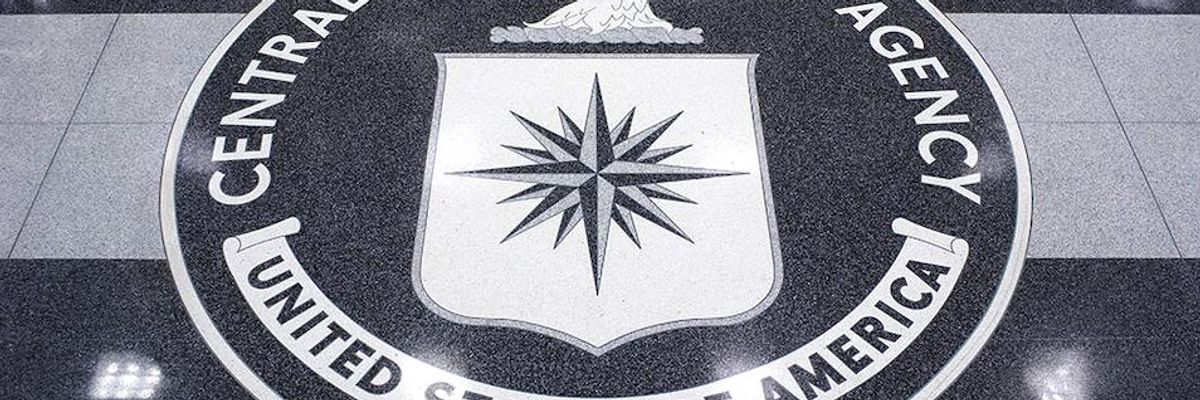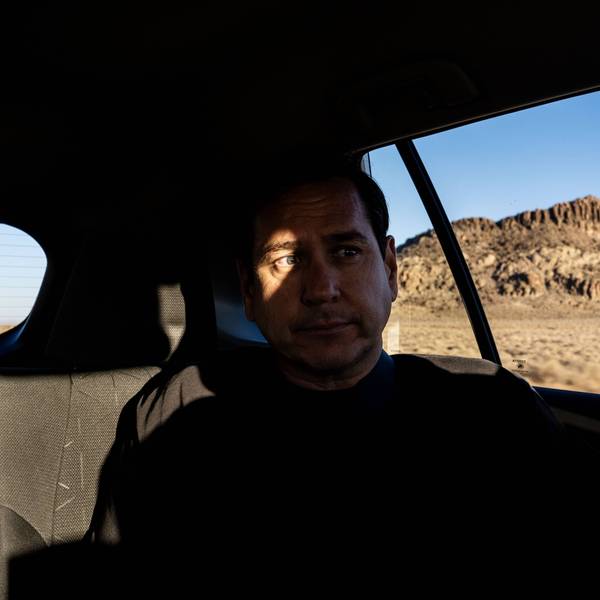
This C.I.A. in the lobby of the agency's Original Headquarters Building. (Photo: C.I.A.)
After US Senator Asks Public to 'Imagine' CIA Interfering in Foreign Elections, Historians Are Like... Uhhh
Australia, of course, is not the only country whose politics the U.S. has meddled in since the creation of the C.I.A. in 1947.
Comments from Sen. Mark Warner responding to reports that Attorney General Bill Barr asked a number of world governments for help in refuting the investigation into Russian interference with the 2016 U.S. election were met with ridicule Friday as observers mocked the suggestion that the CIA would never do such a thing.
Warner, a Virginia Democrat, made the remarks to NBC in an interview over the latest revelations in the still-unfolding whistleblower scandal that has triggered an impeachment inquiry into President Donald Trump. News that Barr reached out to intelligence agencies in Australia, Italy and the United Kingdom for help in probing the Russian investigation has added to the fire.
"Can you imagine if the CIA was asked to provide damaging evidence on a political opponent in Australia?" Warner said. "There would be outrage in our political establishment."
There's just one problem with Warner's example of the CIA becoming involved in Australian politics--as one Twitter user observed, the CIA "literally did that" in 1975, covertly taking down the pro-independence government of then-Prime Minister Gough Whitlam. Whitlam had proposed shutting down Pine Gap, the U.S. satellite intelligence gathering center in central Australia, and exposing U.S. intelligence operations in the country, a move that sent the CIA into panic mode.
In other words, as Grayzone journalist Anya Parampil tweeted, Warner's hypothetical was "almost as outrageous as the CIA carrying out a coup against Australia's democratically elected leftist leader who stood up to the agency, which it actually did."
As John Pilger recounted at The Guardian in 2014:
The Americans and British worked together. In 1975, Whitlam discovered that Britain's MI6 was operating against his government. "The Brits were actually decoding secret messages coming into my foreign affairs office," he said later. One of his ministers, Clyde Cameron, told me, "We knew MI6 was bugging cabinet meetings for the Americans." In the 1980s, senior CIA officers revealed that the "Whitlam problem" had been discussed "with urgency" by the CIA's director, William Colby, and the head of MI6, Sir Maurice Oldfield. A deputy director of the CIA said: "[governor-general of Australia, Sir John Kerr] did what he was told to do."
[...]
On 11 November--the day Whitlam was to inform parliament about the secret CIA presence in Australia--he was summoned by Kerr. Invoking archaic vice-regal "reserve powers," Kerr sacked the democratically elected prime minister. The "Whitlam problem" was solved, and Australian politics never recovered, nor the nation its true independence.
Australia, of course, is not the only country whose politics the U.S. has meddled in since the creation of the CIA in 1947. Among the other countries are China, East Germany, Iran, Costa Rica, Egypt, Indonesia, British Guiana, Vietnam, Cambodia, Laos, Congo, France, Brazil, Dominican Republic, Cuba, Bolivia, Indonesia, Ghana, Chile, Greece, Rica, Bolivia, Angola, Zaire, Portugal, Jamaica, the Seychelles, Chad, Grenada, Suriname, Fiji, Nicaragua, Panama, Bulgaria, Albania, Yugoslavia, Ecuador, Afghanistan, Venezuela, Iraq, Haiti, Somalia, Libya, and Syria.
The above is an incomplete list.
An Urgent Message From Our Co-Founder
Dear Common Dreams reader, The U.S. is on a fast track to authoritarianism like nothing I've ever seen. Meanwhile, corporate news outlets are utterly capitulating to Trump, twisting their coverage to avoid drawing his ire while lining up to stuff cash in his pockets. That's why I believe that Common Dreams is doing the best and most consequential reporting that we've ever done. Our small but mighty team is a progressive reporting powerhouse, covering the news every day that the corporate media never will. Our mission has always been simple: To inform. To inspire. And to ignite change for the common good. Now here's the key piece that I want all our readers to understand: None of this would be possible without your financial support. That's not just some fundraising cliche. It's the absolute and literal truth. We don't accept corporate advertising and never will. We don't have a paywall because we don't think people should be blocked from critical news based on their ability to pay. Everything we do is funded by the donations of readers like you. Will you donate now to help power the nonprofit, independent reporting of Common Dreams? Thank you for being a vital member of our community. Together, we can keep independent journalism alive when it’s needed most. - Craig Brown, Co-founder |
Comments from Sen. Mark Warner responding to reports that Attorney General Bill Barr asked a number of world governments for help in refuting the investigation into Russian interference with the 2016 U.S. election were met with ridicule Friday as observers mocked the suggestion that the CIA would never do such a thing.
Warner, a Virginia Democrat, made the remarks to NBC in an interview over the latest revelations in the still-unfolding whistleblower scandal that has triggered an impeachment inquiry into President Donald Trump. News that Barr reached out to intelligence agencies in Australia, Italy and the United Kingdom for help in probing the Russian investigation has added to the fire.
"Can you imagine if the CIA was asked to provide damaging evidence on a political opponent in Australia?" Warner said. "There would be outrage in our political establishment."
There's just one problem with Warner's example of the CIA becoming involved in Australian politics--as one Twitter user observed, the CIA "literally did that" in 1975, covertly taking down the pro-independence government of then-Prime Minister Gough Whitlam. Whitlam had proposed shutting down Pine Gap, the U.S. satellite intelligence gathering center in central Australia, and exposing U.S. intelligence operations in the country, a move that sent the CIA into panic mode.
In other words, as Grayzone journalist Anya Parampil tweeted, Warner's hypothetical was "almost as outrageous as the CIA carrying out a coup against Australia's democratically elected leftist leader who stood up to the agency, which it actually did."
As John Pilger recounted at The Guardian in 2014:
The Americans and British worked together. In 1975, Whitlam discovered that Britain's MI6 was operating against his government. "The Brits were actually decoding secret messages coming into my foreign affairs office," he said later. One of his ministers, Clyde Cameron, told me, "We knew MI6 was bugging cabinet meetings for the Americans." In the 1980s, senior CIA officers revealed that the "Whitlam problem" had been discussed "with urgency" by the CIA's director, William Colby, and the head of MI6, Sir Maurice Oldfield. A deputy director of the CIA said: "[governor-general of Australia, Sir John Kerr] did what he was told to do."
[...]
On 11 November--the day Whitlam was to inform parliament about the secret CIA presence in Australia--he was summoned by Kerr. Invoking archaic vice-regal "reserve powers," Kerr sacked the democratically elected prime minister. The "Whitlam problem" was solved, and Australian politics never recovered, nor the nation its true independence.
Australia, of course, is not the only country whose politics the U.S. has meddled in since the creation of the CIA in 1947. Among the other countries are China, East Germany, Iran, Costa Rica, Egypt, Indonesia, British Guiana, Vietnam, Cambodia, Laos, Congo, France, Brazil, Dominican Republic, Cuba, Bolivia, Indonesia, Ghana, Chile, Greece, Rica, Bolivia, Angola, Zaire, Portugal, Jamaica, the Seychelles, Chad, Grenada, Suriname, Fiji, Nicaragua, Panama, Bulgaria, Albania, Yugoslavia, Ecuador, Afghanistan, Venezuela, Iraq, Haiti, Somalia, Libya, and Syria.
The above is an incomplete list.
Comments from Sen. Mark Warner responding to reports that Attorney General Bill Barr asked a number of world governments for help in refuting the investigation into Russian interference with the 2016 U.S. election were met with ridicule Friday as observers mocked the suggestion that the CIA would never do such a thing.
Warner, a Virginia Democrat, made the remarks to NBC in an interview over the latest revelations in the still-unfolding whistleblower scandal that has triggered an impeachment inquiry into President Donald Trump. News that Barr reached out to intelligence agencies in Australia, Italy and the United Kingdom for help in probing the Russian investigation has added to the fire.
"Can you imagine if the CIA was asked to provide damaging evidence on a political opponent in Australia?" Warner said. "There would be outrage in our political establishment."
There's just one problem with Warner's example of the CIA becoming involved in Australian politics--as one Twitter user observed, the CIA "literally did that" in 1975, covertly taking down the pro-independence government of then-Prime Minister Gough Whitlam. Whitlam had proposed shutting down Pine Gap, the U.S. satellite intelligence gathering center in central Australia, and exposing U.S. intelligence operations in the country, a move that sent the CIA into panic mode.
In other words, as Grayzone journalist Anya Parampil tweeted, Warner's hypothetical was "almost as outrageous as the CIA carrying out a coup against Australia's democratically elected leftist leader who stood up to the agency, which it actually did."
As John Pilger recounted at The Guardian in 2014:
The Americans and British worked together. In 1975, Whitlam discovered that Britain's MI6 was operating against his government. "The Brits were actually decoding secret messages coming into my foreign affairs office," he said later. One of his ministers, Clyde Cameron, told me, "We knew MI6 was bugging cabinet meetings for the Americans." In the 1980s, senior CIA officers revealed that the "Whitlam problem" had been discussed "with urgency" by the CIA's director, William Colby, and the head of MI6, Sir Maurice Oldfield. A deputy director of the CIA said: "[governor-general of Australia, Sir John Kerr] did what he was told to do."
[...]
On 11 November--the day Whitlam was to inform parliament about the secret CIA presence in Australia--he was summoned by Kerr. Invoking archaic vice-regal "reserve powers," Kerr sacked the democratically elected prime minister. The "Whitlam problem" was solved, and Australian politics never recovered, nor the nation its true independence.
Australia, of course, is not the only country whose politics the U.S. has meddled in since the creation of the CIA in 1947. Among the other countries are China, East Germany, Iran, Costa Rica, Egypt, Indonesia, British Guiana, Vietnam, Cambodia, Laos, Congo, France, Brazil, Dominican Republic, Cuba, Bolivia, Indonesia, Ghana, Chile, Greece, Rica, Bolivia, Angola, Zaire, Portugal, Jamaica, the Seychelles, Chad, Grenada, Suriname, Fiji, Nicaragua, Panama, Bulgaria, Albania, Yugoslavia, Ecuador, Afghanistan, Venezuela, Iraq, Haiti, Somalia, Libya, and Syria.
The above is an incomplete list.

